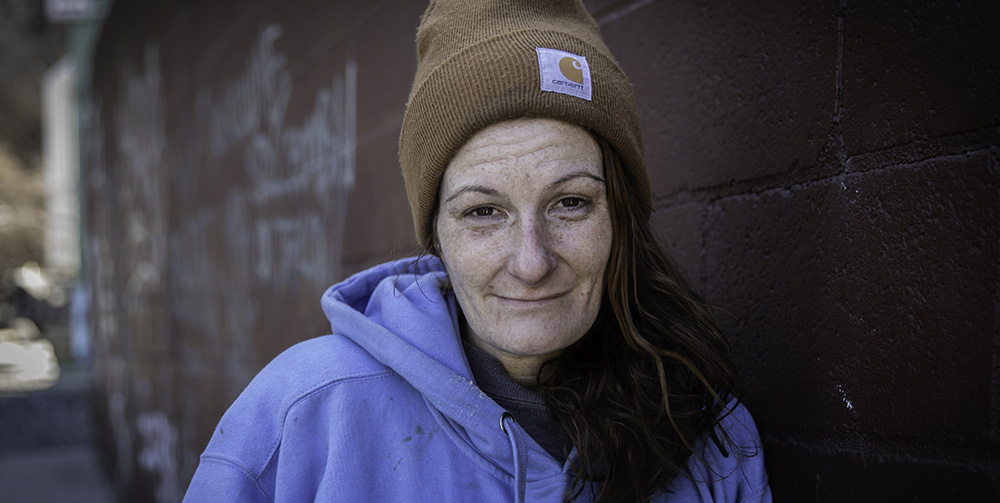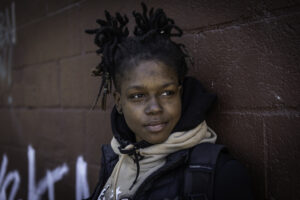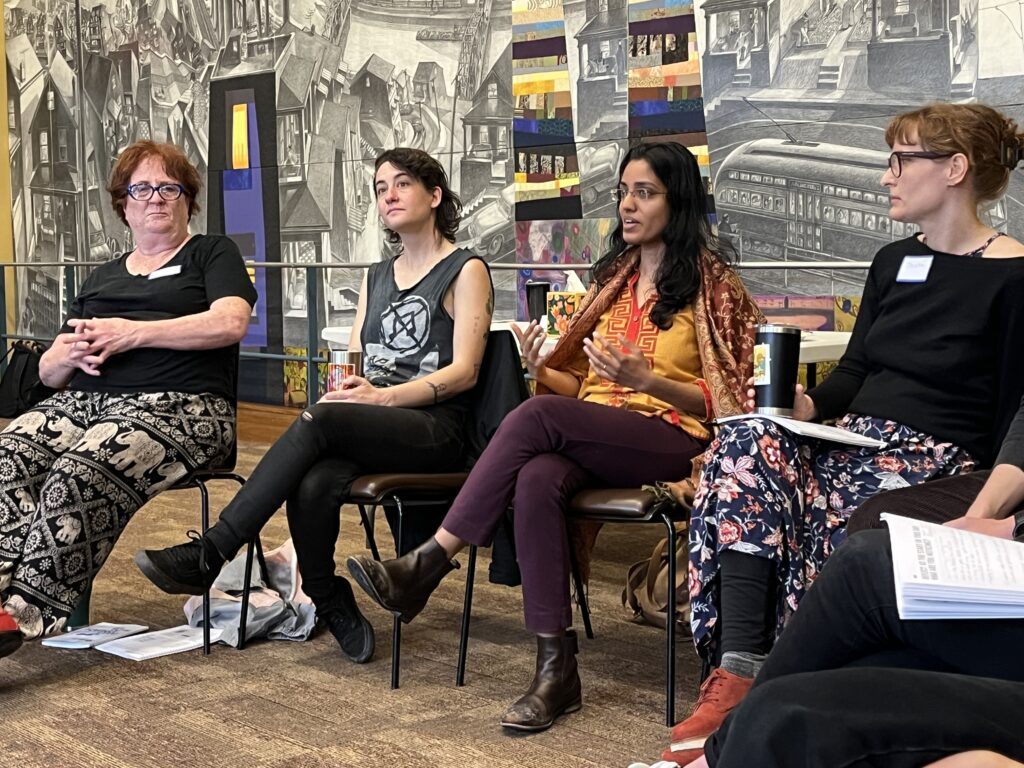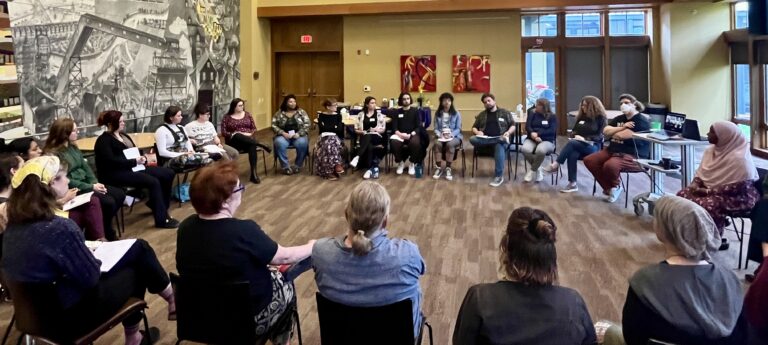Home > Delivering Compassionate End-of-Life Care to Pittsburgh’s Most Vulnerable Residents
Delivering Compassionate End-of-Life Care to Pittsburgh’s Most Vulnerable Residents
by Loren Talbot
This past May, a group of direct care providers to the unhoused community came together in the East Liberty neighborhood of Pittsburgh to learn what it means to show up with a doula mindset in their work. The two-day training brought together social workers, nurses and medical assistants, outreach workers, end-of-life doulas, government employees, hospice volunteers, home health aides, and physicians, as well as individuals who have managed shelters, are pursuing grief education, or carry lived experience.
This diverse cross section reflected an engaged community of care providers and advocates already in place across health care, social services, harm reduction, and community-based support networks, many of whom are well-positioned to integrate ongoing end-of-life training and practices into their work with vulnerable populations to better ensure compassionate, equitable end-of-life care for all.

This diverse cross section reflected an engaged community of care providers and advocates already in place across health care, social services, harm reduction, and community-based support networks, many of whom are well-positioned to integrate ongoing end-of-life training and practices into their work with vulnerable populations to better ensure compassionate, equitable end-of-life care for all.
Training Informed by Lived Experience
This all emerged after a fortuitous encounter at The Coalition to Transform Advanced Care’s doula mixer connected INELDA with a team member at the McElhattan Foundation. In January of 2024, INELDA was awarded a grant through the McElhattan Foundation to address end-of-life education in Pittsburgh and western Pennsylvania for care facilities and others offering direct support to people experiencing homelessness. INELDA partnered with Bridge to the Mountains, whose work includes street outreach, care coordination, harm reduction, and environmental outreach to ensure unhoused people have a space free from trash and hazardous waste. Our partnership efforts were led by street outreach coordinator Julie Armagost and supported by executive director Calla Kainaroi and founder Dave Lettrich.
Julie was able to conduct interviews with Bridge clients, hearing their direct experiences with death and dying. She also gathered information

Photo by Maranie Stabb
regarding what needs they may have pertaining to end of life. An unexpected outcome was the reprocessing Julie was able to facilitate just by conducting the interviews themselves.
Client 4: So many of the people were just so young and their deaths unexpected. It feels like it affects us all of the time, almost like we’re just waiting for each other to die, and it’s not even that shocking when it happens anymore. I lost my daughter unexpectedly in her early 20s, and since then it just feels like it’s something I’m around all of the time, but I try not to think about it too much or it’s too painful and overwhelming.
Through the interview process itself, Julie was able to hear the desires and support needed of the people she works with (in some cases for years without these conversations being shared). Being unhoused leads to a dramatic drop in life expectancy and exposure to a lot more deaths, as well as more threats to their life than those living with stable shelter. Clients were able to share their experiences and needs through the survey process.
Client 1: I think about my daughter a lot and how I would want to be buried in some place where she could come visit if she wanted. My sister was cremated when she died suddenly a few years ago, and I just don’t understand why my mom did that. I so wish I had a place where I could go visit her. I would like to be buried in the cemetery with my other family members. I wish my sister had been buried there too. I’ve often thought of taking my own life when things get so unbearable living like this, but I don’t because I was raised Roman Catholic and I don’t know if I really believe there’s a heaven or a hell, but I just can’t take the chance—because if there is, I wouldn’t want to risk not being in heaven with my sister and getting to see her again.
Julie was also joined by renowned photographer Maranie Staab, who captured voices and photos during the interviews. With these images and voices captured, we were able to share with the attendees and the larger community the stories revealed during the interviews.
 The Weekend Training
The Weekend Training
Over the course of the weekend, educators Nzinga Abdullah-Aziz and Erika Lim, joined by Julie and INELDA’s director of education, Omni Kitts Ferrara, delivered a custom-created curriculum for attendees that included the INELDA Doula Approach, role-playing exercises, systems work, grief reprocessing, and lots of brainstorming around changes to the current system to provide optimal care. The training was designed to equip direct service providers to support the unhoused or recently housed population, including people living outside and “rough sleepers,” as well as those living in shelters, transitional housing, and current residences.
By working with professionals who are embedded within hospital systems, hospices, nonprofits, and governmental agencies, the project influenced practices not only of those serving the unhoused but also systems serving the broader public, increasing the potential impacts of the training. Participants in the training also provided insights into how the program impacted both their work and personal growth.
Participant 1: The moments of emotional connection during some of the breakout activities stood out because they were extremely moving. And overall I was struck by the excellent communication skills of the trainers. Nzinga and Erika both spoke with clarity and confidence that led me to immediately trust them and their expertise.
Gratitude and Next Steps
Partners and supporters were critical to the success of this project. We are deeply informed by the voices of Danielle Schnauber Jones and Maisie Taibbi, street medicine team nurses with Pittsburgh Mercy’s Operation Safety Net, the voices from hospices serving unhoused people including Chris Erdman from YoloCares, end-of-life doula Kimberly Petersen from The Inn Between, and Sherry Campbell at Welcome Home of Chattanooga. We are additionally grateful to the National Alliance to End Homelessness, the Street Medicine Institute, Pittsburgh Community Deathcare, and the Jewish Healthcare Foundation for sharing knowledge and spreading the word about our work. Lastly, we are grateful for advocate and end-of-life doula Kaki Marshall-Bird for kickstarting this important project.
INELDA is committed to applying the insights gained and the relationships built through this project to further strengthen compassionate, community-centered end-of-life care for Pittsburgh’s unhoused and other vulnerable populations. These learnings will inform our ongoing efforts to advance equity and dignity in deathcare for those most often overlooked. We hope to continue this important work, in partnership with the McElhattan Foundation and other local stakeholders, including Bridge to the Mountains. We are actively exploring ways to support the integration of the ideas that emerged from the community during the training and further the work of doulas working with people experiencing homelessness.

